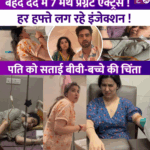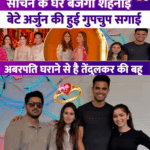The Touch of Hope: How a Little Girl’s Gift Brought Two Families Together Forever

The hands that this woman and her family are touching with such tenderness—caressing, kissing, holding with love—do not belong to their daughter. In fact, this girl has no direct relation to them at all. And yet, through her, a mother is able to feel the touch, the love, and the very presence of her lost child once more.
You might be wondering: how is this possible? The story behind these pictures is so moving, it’s impossible not to be touched. The hand that the grieving mother is holding actually belonged to her daughter, Ria Bobby Mistry, who is no longer in this world.
The young girl in the photos is Anamta Ahmed, who tragically lost her right hand in an accident. Miraculously, she received a hand transplant—the donor was none other than Ria, whose life ended far too soon at the age of nine due to a brain hemorrhage.
Ria couldn’t be saved, but even in death, her gift illuminated Anamta’s life forever. On Raksha Bandhan—the festival celebrating the bond between brothers and sisters—Ria’s home was filled with sorrow and remembrance. That’s when Anamta came to visit, bringing light and love into a grieving family’s shattered world, ready to tie a rakhi on Ria’s brother and share her joy. For a moment, it was as if Ria was with them again.
The emotional scene was profound: Ria’s mother held Anamta’s hand, kissing it, cherishing the sense that a part of her daughter had returned. Ria’s father embraced Anamta, as if he could hold his daughter again, if only for a moment. The brother’s wrist, once empty, was adorned with his sister’s rakhi again. Happiness and hope filled the house, if only for a little while.
What makes this story even more remarkable is the unity and compassion bridging two very different families. One Hindu, one Muslim—but in that intimate circle of hope and gratitude, religion didn’t matter. Humanity did.
The journey began years earlier, when 13-year-old Anamta suffered a severe electric shock, which resulted in her right hand being so badly burned that doctors had no choice but to amputate. Her family was devastated, but Anamta refused to give up. She endured 50 days in the hospital, underwent multiple surgeries, and learned to write with her left hand—managing, against all odds, to become her school’s top student with a remarkable 92% in her 10th Board Exams.
Her courage inspired many. Famous artist Piyush Mishra even wrote a song for her, calling her a “Flower Fairy.” Amidst all this adversity, a glimmer of hope appeared when doctors called her family: could Anamta have a hand transplant? The answer was yes, but it required a donor.
A year passed, then fate intervened. When nine-year-old Ria Bobby Mistry was declared brain dead, her bereaved family made a brave and selfless choice—to donate her organs, even though they never found a recipient in Gujarat, their own region. The gift was sent to Mumbai, where Anamta received Ria’s right hand and, with it, another chance at a full life.
The bond between their families is now unbreakable. While Anamta is gradually regaining movement in her new hand, she treasures each day, not taking a single moment for granted: “How can you thank someone for a gift like this? I carry her hand, her story, her spirit with me always.”
Stories like this show how organ donation is not just about loss, but about hope, legacy, and the power of kindness. For Ria’s parents, the knowledge that their daughter’s hand is giving another girl a future brings solace and meaning amid their grief. For Anamta, each new day is a testament to resilience, gratitude, and the importance of giving back: “We often complain about our bodies, but forget that what we have is someone else’s prayer.”
When Anamta tied the rakhi on Ria’s brother’s wrist, there wasn’t a dry eye in the house. Through courage and compassion, these two families—once strangers, now bound by something deeper than blood—redefined what it means to love, to lose, and to heal.
Do you believe stories like Anamta and Ria’s could inspire others? Can acts of organ donation become a bridge of hope, irrespective of religion or background? Share your thoughts in the comments, and for more such stories of hope and humanity, stay tuned to Live Hindustan.
Because sometimes, the most powerful stories are those that bring us together—even after loss.
News
Kerala Tragedy: Young Woman’s Suicide Note Fuels “Love Jihad” Debate—Family and Police Pursue Justice
Kerala Tragedy: Young Woman’s Suicide Note Fuels “Love Jihad” Debate—Family and Police Pursue Justice On August 9, 2025, a tragic…
A New Milestone for the Tendulkar Family: Arjun Tendulkar Gets Engaged to Sania Chandok of Mumbai’s Prominent Ghai Business Clan
A New Milestone for the Tendulkar Family: Arjun Tendulkar Gets Engaged to Sania Chandok of Mumbai’s Prominent Ghai Business Clan…
Cloudbursts and Flash Floods Wreak Havoc in Himachal: Rivers Swell, Homes Washed Away
Cloudbursts and Flash Floods Wreak Havoc in Himachal: Rivers Swell, Homes Washed Away Fresh reports from Himachal Pradesh bring grim…
Chaos in Mainpuri: Landlady’s Street Protest Over Shop Dispute Leads to High Drama and Police Action
Chaos in Mainpuri: Landlady’s Street Protest Over Shop Dispute Leads to High Drama and Police Action A dramatic scene played…
Communal Tension in Fatehpur: Congress Leaders Detained as Ancient Tomb vs Temple Row Intensifies
Communal Tension in Fatehpur: Congress Leaders Detained as Ancient Tomb vs Temple Row Intensifies Images and videos of the controversy…
Outrage in Balrampur: Disabled Woman Abducted and Gang-Raped—Police Response Under Fire
Outrage in Balrampur: Disabled Woman Abducted and Gang-Raped—Police Response Under Fire Another shocking crime has put a spotlight on women’s…
End of content
No more pages to load






